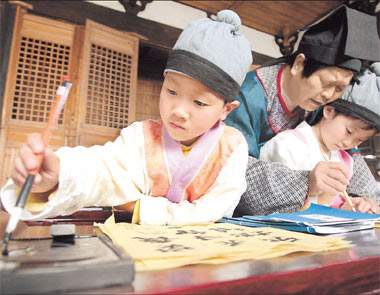
|
LIFE> Travel
 |
|
Historical heartland
By Fei Lai (Shanghai Daily)
Updated: 2008-06-24 16:45  Kids dressed in ancient attire practice calligraphy, demonstrating the scene of ancient schooling.[Shanghai Daily]
Regarded as a land of fortune, Changle Village in Lanxi City, Zhejiang Province, is the only scenic spot in Jiangnan (region south of the middle and lower reaches of the Yangtze River) that truly showcases the culture of an emperor. This is the place where Zhu Yuanzhang, the first emperor of the Ming Dynasty (1368-1644), made crucial steps to build his empire. Zhu received assistance from leading statesmen Liu Bowen and Song Lian, studied at a Confucian school of philosophy, and later applied what he'd learned in his strategic governing of the area. A decade later, he proclaimed himself emperor in Nanjing, now capital of neighboring Jiangsu Province. Changle Village is famed for its uniquely preserved traditional Chinese culture and folk activities. Wuju Opera, also known as Jinhua Opera, is one of Zhejiang Province's best-known art forms. Every year, Changle villagers perform this opera on the local stage to encourage their crops and to pray for a generous harvest. Changle villagers have a great love and respect for the lotus plant. They consider it an ideal food material and medical ingredient. On July 7 each year, villagers follow a tradition of floating lotus lanterns down the river and praying for happiness. Another ritual involves offering a sacrifice to the Big Dipper and praying for good fortune. The area is rich in the architecture of the Yuan (1271-1368) and Ming dynasties. One of the most famous is Kulun Hall from the Ming Dynasty which features two impressive stone gates. Zishu Hall is another fascinating building, built in the Qing Dynasty (1644-1911), and features vertical pillars on the outside that have remained strangely crooked for longer than anybody can remember. |